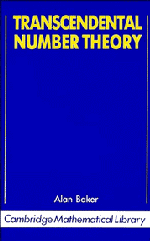Book contents
- Frontmatter
- Contents
- Preface
- 1 The origins
- 2 Linear forms in logarithms
- 3 Lower bounds for linear forms
- 4 Diophantine equations
- 5 Class numbers of imaginary quadratic fields
- 6 Elliptic functions
- 7 Rational approximations to algebraic numbers
- 8 Mahler's classification
- 9 Metrical theory
- 10 The exponential function
- 11 The Siegel–Shidlovsky theorems
- 12 Algebraic independence
- Bibliography
- Original papers
- Further publications
- New developments
- Index
- Frontmatter
- Contents
- Preface
- 1 The origins
- 2 Linear forms in logarithms
- 3 Lower bounds for linear forms
- 4 Diophantine equations
- 5 Class numbers of imaginary quadratic fields
- 6 Elliptic functions
- 7 Rational approximations to algebraic numbers
- 8 Mahler's classification
- 9 Metrical theory
- 10 The exponential function
- 11 The Siegel–Shidlovsky theorems
- 12 Algebraic independence
- Bibliography
- Original papers
- Further publications
- New developments
- Index
Summary
Introduction
Diophantine analysis pertains, in general terms, to the study of the solubility of equations in integers. Although researches in this field have their roots in antiquity and a history of the subject amounts, more or less, to a history of mathematics itself, it is only in relatively recent times that there have emerged any general theories, and we shall accordingly begin our discussion in 1900 by referring again to Hilbert's famous list of problems.
The tenth of these asked for a universal algorithm for deciding whether or not a given Diophantine equation, that is, an equation f(x1, …, xn) = 0, where f denotes a polynomial with integer coefficients, is soluble in integers x1, …, xn. Though Hilbert posed his question in terms of solubility, there are, of course, many other sorts of information that one might like to have in this connexion; for instance, one might enquire as to whether a particular equation has infinitely many solutions, or one might seek some description of the distribution or size of the solutions. In 1970, Matijasevic, developing work of Davis, Robinson and Putnam, proved that a general algorithm of the type sought by Hilbert does not in fact exist. A more realistic problem arises, however, if one limits the number of variables, and for, in particular, polynomials in two unknowns our knowledge is now quite substantial.
- Type
- Chapter
- Information
- Transcendental Number Theory , pp. 36 - 46Publisher: Cambridge University PressPrint publication year: 1975



